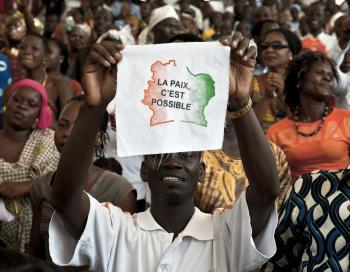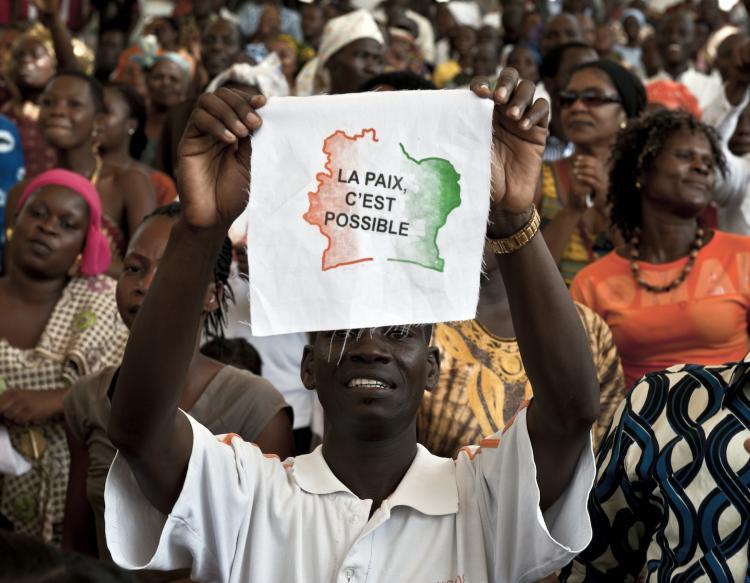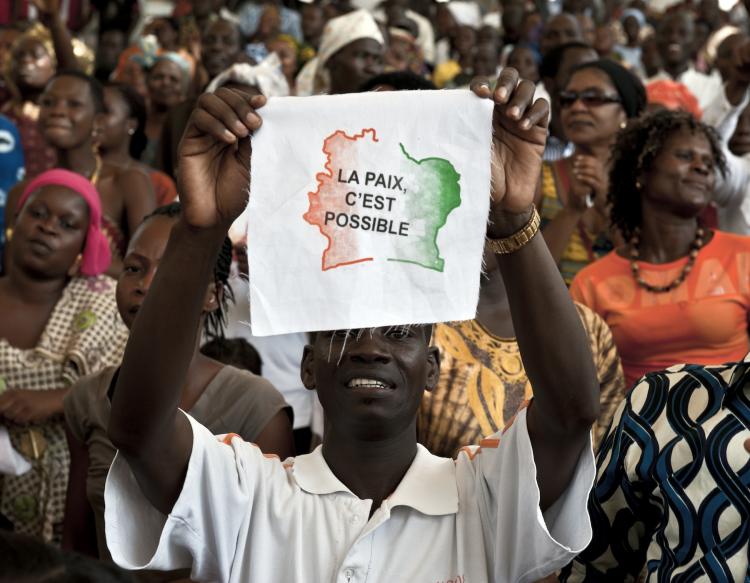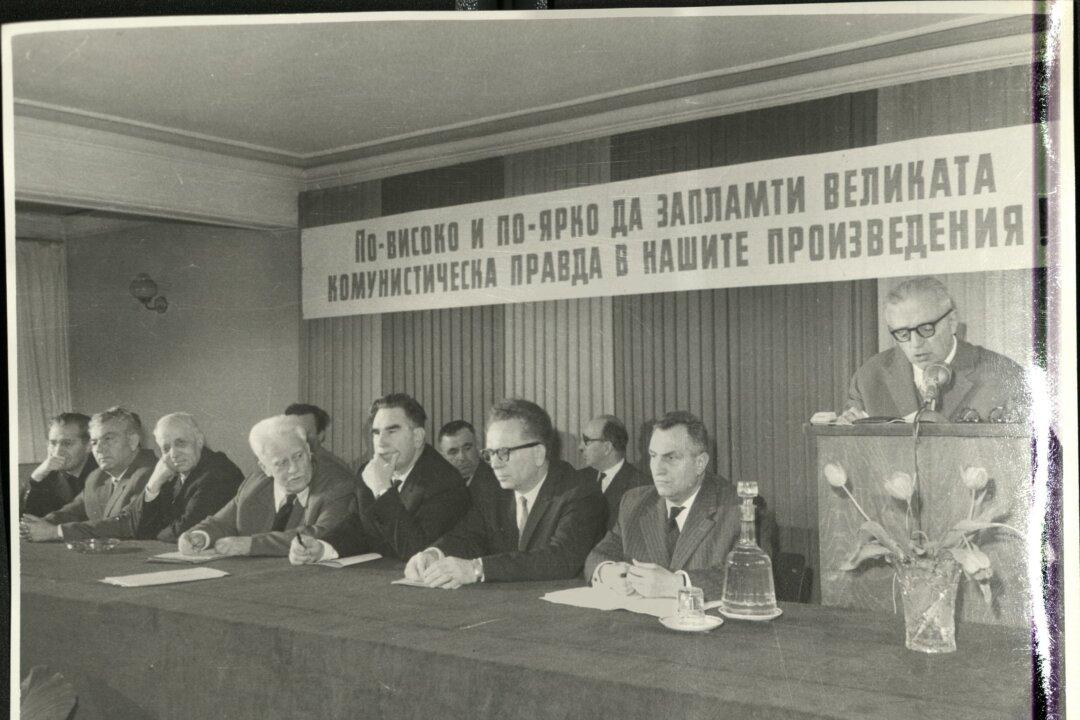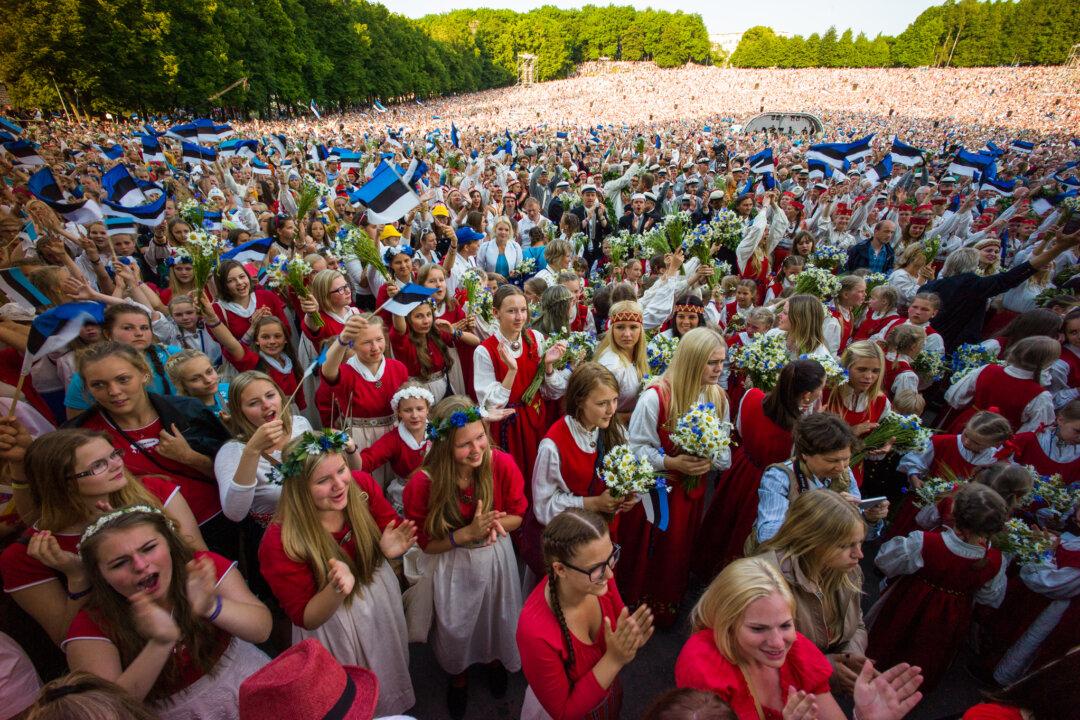Monday’s arrest of former President Laurent Gbagbo, ending the four-month post-election standoff, was largely met with relief in Ivory Coast. But the divisions in the country—possibly worse now than at the time of the election last November—means the nation’s legitimate president, Alassane Ouattara, will have to be a skillful broker if he hopes to bring the battered nation together.
Ouattara, a former deputy director of the International Monetary Fund (IMF), had the support of a majority of voters in last November’s election. Nevertheless, the vote split between Ouattara and Gbagbo ran along much the same lines as north-south alliances in the 2002–3 civil war.
Gbagbo posited the fight for the presidency—and his fight to stay on even after losing the election—as a battle for the nation itself for true Ivorians, accusing Ouattara of being a puppet of France and the West.
On April 1, with the support of France and the United Nations, Ouattara launched what became a 10-day final siege ending with the capture of Gbagbo and his wife, who had been hiding in a bunker beneath the presidential palace.
In his first statement to the Ivorian people since the arrest, Ouattara explained that the military operation was aimed at ending the security and humanitarian crisis plaguing the whole country, which he blamed on the obstinacy of the previous president.
Ouattara appealed to all Ivorians to uphold peace and to abstain from any acts of vengeance and repression and he announced plans to establish a National Trust and Reconciliation Commission to investigate crimes perpetrated during the years of war.
“All provisions will be made in collaboration with international tribunals and human rights organizations, to investigate, prosecute, judge and punish severely the perpetrators of these unspeakable acts,” said Ouattara in a statement from April 12.
Many crimes perpetrated in Ivory Coast by both sides of the divide over the last months have come to light. Last week, a U.N. human rights team found over 100 bodies within 24 hours.
U.N. High Commissioner for Human Rights Navi Pillay condemned the series of vicious attacks on civilians, calling the reports he was receiving utterly horrifying. “They are finding more bodies every day,” he said.
“The first priority is to do everything possible to stop further killings and violations. But equally important is to end impunity in Ivory Coast,” stressed Pillay.
A report by Human Rights Watch from April 9 states that Ouattara’s forces of killed hundreds of civilians, raped more than 20 alleged supporters of his rival, and burned at least 10 villages in the far western region of the country. Gbagbo’s forces were likewise blamed for killing more than 100 presumed Ouattara supporters.
Although the death toll in the recent conflict is unclear, some organizations estimate it to be at least 1,500. U.N. aid officials say that up to 1 million Ivoirians have been displaced in the violence, including 135,000 seeking refuge in Liberia.
The International Criminal Court (ICC) is also conducting steps toward a requesting it be allowed to start a full investigation into international crimes committed in Ivory Coast.
Next: Prosecuting Gbagbo?
But whether the ICC will prosecute Gbagbo will depend on a decision, which has to come from inside the country, says Mariya Nedelcheva, member of European Parliament and part of the European Union delegation to Africa.
According to Nedelcheva, the two main objectives of Ouattara as president will be regaining peace and stability, and helping the country recover from its current humanitarian crisis. To do this, he will have to reconcile the two sides and try to prevent further exacerbation between them in the aftermath of the arrest.
“This will be Ouattara’s biggest challenge: to play the role of unifier of the nation,” says Nedelcheva.
In her assessment, from now on democracy and political pluralism in Ivory Coast will also be tested. This means that those who supported Gbagbo will also need to be involved in the process of recovery.
“If this fails to be done, we risk running in the same situation we witnessed four months ago.”
For the moment, joy and happiness over a new freedom dominated Abidjan on April 12, although some were commenting with sadness about the number of people killed in the crisis. Merchants and taxis were getting back to the streets.
“The mood felt like: ‘We’re all tired of this war and we just want to live in peace and unity,’” wrote Ivorian blogger Kanigui Yeo via e-mail, using a pseudonym because of threats he has received for his posts on Twitter.
But this unity might be hard to achieve. According to Kwami Ahiabenu from African Elections Project, Gbagbo’s followers, who accounted for 45.9 percent of the electorate during last November’s elections, are going to be a source of problems for Ouattara. One of the reasons is that they strongly believe Ouattara is not even a true Ivorian because of his origin from Burkina Faso. That, and his close ties to France.
“Ouattara’s basket will be full as a president: ruling a deeply divided conflict prone country, broken economy and perceived illegitimacy,” wrote Ahiabenu via e-mail from Ghana.
Gbagbo’s supporters are unlikely to simply change their hearts because their leader has been arrested.
Gbagbo’s supporters know that their leader ultimately surrendered because of pressure from the international community and that he had no other choice, says Ambroise Pierre, head of Reporters Without Borders’ Africa desk.
“They will feel wronged and see the situation as an act against Ivory Coast and against Gbagbo,” said Pierre.
Unifying the troops from the warring sides—Republican Force of Ivory Coast loyal to Ouattara, and the militants faithful to Gbagbo—is another massive challenge.
“How will Ouattara manage to merge these two completely different armies with completely different philosophies? That is very difficult,” says Julie Owono, a Cameroonian blogger for Global Voice.
Still, Ouattara has the necessary legitimacy both from both large portions of the population in Ivory Coast and abroad. On top of that, he has the reputation of being a gentle man fostering peace.
“Ouattara is a man of peace. This is the word he has been saying for the last four months,” says Owono.
Ouattara, a former deputy director of the International Monetary Fund (IMF), had the support of a majority of voters in last November’s election. Nevertheless, the vote split between Ouattara and Gbagbo ran along much the same lines as north-south alliances in the 2002–3 civil war.
Gbagbo posited the fight for the presidency—and his fight to stay on even after losing the election—as a battle for the nation itself for true Ivorians, accusing Ouattara of being a puppet of France and the West.
On April 1, with the support of France and the United Nations, Ouattara launched what became a 10-day final siege ending with the capture of Gbagbo and his wife, who had been hiding in a bunker beneath the presidential palace.
In his first statement to the Ivorian people since the arrest, Ouattara explained that the military operation was aimed at ending the security and humanitarian crisis plaguing the whole country, which he blamed on the obstinacy of the previous president.
Ouattara appealed to all Ivorians to uphold peace and to abstain from any acts of vengeance and repression and he announced plans to establish a National Trust and Reconciliation Commission to investigate crimes perpetrated during the years of war.
“All provisions will be made in collaboration with international tribunals and human rights organizations, to investigate, prosecute, judge and punish severely the perpetrators of these unspeakable acts,” said Ouattara in a statement from April 12.
Many crimes perpetrated in Ivory Coast by both sides of the divide over the last months have come to light. Last week, a U.N. human rights team found over 100 bodies within 24 hours.
U.N. High Commissioner for Human Rights Navi Pillay condemned the series of vicious attacks on civilians, calling the reports he was receiving utterly horrifying. “They are finding more bodies every day,” he said.
“The first priority is to do everything possible to stop further killings and violations. But equally important is to end impunity in Ivory Coast,” stressed Pillay.
A report by Human Rights Watch from April 9 states that Ouattara’s forces of killed hundreds of civilians, raped more than 20 alleged supporters of his rival, and burned at least 10 villages in the far western region of the country. Gbagbo’s forces were likewise blamed for killing more than 100 presumed Ouattara supporters.
Although the death toll in the recent conflict is unclear, some organizations estimate it to be at least 1,500. U.N. aid officials say that up to 1 million Ivoirians have been displaced in the violence, including 135,000 seeking refuge in Liberia.
The International Criminal Court (ICC) is also conducting steps toward a requesting it be allowed to start a full investigation into international crimes committed in Ivory Coast.
Next: Prosecuting Gbagbo?
But whether the ICC will prosecute Gbagbo will depend on a decision, which has to come from inside the country, says Mariya Nedelcheva, member of European Parliament and part of the European Union delegation to Africa.
According to Nedelcheva, the two main objectives of Ouattara as president will be regaining peace and stability, and helping the country recover from its current humanitarian crisis. To do this, he will have to reconcile the two sides and try to prevent further exacerbation between them in the aftermath of the arrest.
“This will be Ouattara’s biggest challenge: to play the role of unifier of the nation,” says Nedelcheva.
In her assessment, from now on democracy and political pluralism in Ivory Coast will also be tested. This means that those who supported Gbagbo will also need to be involved in the process of recovery.
“If this fails to be done, we risk running in the same situation we witnessed four months ago.”
For the moment, joy and happiness over a new freedom dominated Abidjan on April 12, although some were commenting with sadness about the number of people killed in the crisis. Merchants and taxis were getting back to the streets.
“The mood felt like: ‘We’re all tired of this war and we just want to live in peace and unity,’” wrote Ivorian blogger Kanigui Yeo via e-mail, using a pseudonym because of threats he has received for his posts on Twitter.
But this unity might be hard to achieve. According to Kwami Ahiabenu from African Elections Project, Gbagbo’s followers, who accounted for 45.9 percent of the electorate during last November’s elections, are going to be a source of problems for Ouattara. One of the reasons is that they strongly believe Ouattara is not even a true Ivorian because of his origin from Burkina Faso. That, and his close ties to France.
“Ouattara’s basket will be full as a president: ruling a deeply divided conflict prone country, broken economy and perceived illegitimacy,” wrote Ahiabenu via e-mail from Ghana.
Gbagbo’s supporters are unlikely to simply change their hearts because their leader has been arrested.
Gbagbo’s supporters know that their leader ultimately surrendered because of pressure from the international community and that he had no other choice, says Ambroise Pierre, head of Reporters Without Borders’ Africa desk.
“They will feel wronged and see the situation as an act against Ivory Coast and against Gbagbo,” said Pierre.
Unifying the troops from the warring sides—Republican Force of Ivory Coast loyal to Ouattara, and the militants faithful to Gbagbo—is another massive challenge.
“How will Ouattara manage to merge these two completely different armies with completely different philosophies? That is very difficult,” says Julie Owono, a Cameroonian blogger for Global Voice.
Still, Ouattara has the necessary legitimacy both from both large portions of the population in Ivory Coast and abroad. On top of that, he has the reputation of being a gentle man fostering peace.
“Ouattara is a man of peace. This is the word he has been saying for the last four months,” says Owono.
